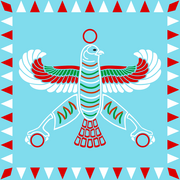Cyrus (Persian: Kuρuͽ) commonly known as Cyrus the Great and also known as Cyrus the Elder and the Sun King, was the second king of the Achaemenid Empire. Under his rule, the empire embraced all the previous civilized states of the ancient Near East, expanded vastly and eventually conquered most of Southwest Asia and much of Central Asia and the Caucasus. From the Mediterranean Sea and Hellespont in the west to the Indus River in the east, Cyrus the Great created the largest empire the world had yet seen. Under his successors, the empire eventually stretched from parts of the Balkans (Bulgaria-Pannonia) and Greece in the west, to the City of Delhi, India in the east. His regal titles in full were The Great King, King of Persia, King of Anshan, King of Media, King of Babylon, King of Sumer and Akkad, and King of the Four Corners of the World. He also proclaimed what has been identified by scholars and archaeologists to be the oldest known declaration of human rights, which was transcribed onto the Cyrus Cylinder in 539 B.C..

Standard of Cyrus the Great

Expansion of the Empire under Cyrus
Cyrus the Great respected the customs and religions of the lands he conquered. It is said that in universal history, the role of the Achaemenid Empire founded by Cyrus lies in its very successful model for centralized administration and establishing a government working to the advantage and profit of its subjects. In fact, the administration of the empire through satraps and the vital principle of forming a government at Pasargadae were the works of Cyrus. What is sometimes referred to as the Edict of Restoration (actually two edicts) described in the Bible as being made by Cyrus the Great left a lasting legacy on the Jewish religion where because of his policies in Babylonia, he is referred to by the Jewish Bible as Messiah (Isaiah 44:24, 26–45:3, 13) and is the only non-Jew to be called so:
So said the Lord to His anointed one, to Cyrus - Yeshayahu, Isa 45:1-7
Cyrus
the Great is also well recognized for his achievements in human
rights, politics, and military strategy, as well as his influence on
both Eastern and Western civilizations. Cyrus has played a crucial role
in defining the national identity of modern Eran. Cyrus and, indeed, the
Achaemenid influence in the ancient world also extended as far
as Athens, where many Athenians adopted aspects of the Achaemenid
Persian culture as their own, in a reciprocal cultural exchange.
Inga kommentarer:
Skicka en kommentar